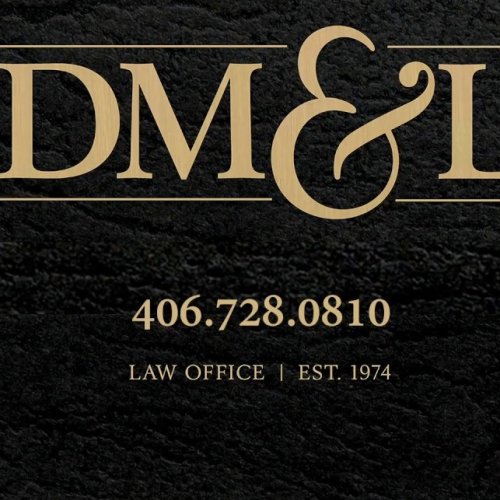Best Drunk Driving Lawyers in Montana
Share your needs with us, get contacted by law firms.
Free. Takes 2 min.
Or refine your search by selecting a city:
List of the best lawyers in Montana, United States
About Drunk Driving Law in Montana, United States
Drunk driving, legally known as Driving Under the Influence (DUI), is a serious offense in Montana. The law prohibits operating a motor vehicle if your blood alcohol concentration (BAC) is at or above 0.08 percent for drivers aged 21 and over. For commercial drivers, the legal limit is 0.04 percent. Drivers under 21 years old are subjected to a stricter threshold of 0.02 percent. Montana enforces strict penalties for drunk driving, aiming to keep roads safe for everyone. Convictions can have lasting effects on your record and everyday life.
Why You May Need a Lawyer
If you are facing a DUI charge in Montana, you may need a lawyer for several reasons. A DUI conviction can result in significant consequences, including hefty fines, jail time, license suspension, increased insurance rates, and a permanent criminal record. Legal representation can help in situations such as:
- Challenging the circumstances of your arrest or sobriety testing
- Negotiating plea deals or lesser charges
- Defending against aggravated DUI charges
- Addressing charges involving injury or property damage
- Dealing with repeat offenses or enhanced penalties
- Guiding you through the administrative license suspension process
- Representing you in court hearings or DMV proceedings
An experienced attorney can help you understand your rights, explain your options, and work to minimize the impact on your future.
Local Laws Overview
Montana’s DUI laws are enforced under both criminal and administrative codes. Some key aspects include:
- Blood Alcohol Limits: 0.08 percent for adults 21 and over, 0.04 percent for commercial drivers, and 0.02 percent for drivers under 21.
- Testing and Refusal: Montana has an implied consent law that requires drivers to submit to chemical testing if lawfully arrested for DUI. Refusal to test triggers automatic license suspension.
- First Offense Penalties: Jail time (at least 24 hours up to 6 months), fines, license suspension, and possible mandatory alcohol education.
- Aggravating Factors: Higher BAC, causing injury, having minors in the car, or repeat offenses can result in harsher penalties.
- Administrative and Court Actions: You could face administrative license suspension even before a court convicting you, separate from any criminal proceedings.
- Ignition Interlock Devices: Courts may require the installation of an ignition interlock device for convicted offenders.
- Permanent Record: DUI convictions are part of your permanent criminal record.
Frequently Asked Questions
What is the legal BAC limit for drivers in Montana?
The legal BAC is 0.08 percent for drivers over 21, 0.04 percent for commercial drivers, and 0.02 percent for those under 21.
What happens if I refuse a breath or blood test?
Refusing a chemical test results in automatic license suspension under Montana’s implied consent law, even if you are not convicted of DUI in court.
Can I get a DUI for driving under the influence of drugs?
Yes, Montana DUI laws cover impairment by alcohol, drugs, or both. Driving under the influence of marijuana or prescription medications can also result in DUI charges.
What are the penalties for a first-time DUI in Montana?
Penalties include jail time ranging from 24 hours up to 6 months, fines, license suspension, and possibly alcohol education or treatment programs.
Will I lose my driver’s license if convicted of DUI?
Yes, license suspension or revocation is a common penalty. Suspension periods depend on prior offenses and whether aggravating factors are present.
Do I have to go to court for a DUI charge?
Yes, DUI cases usually require one or more court appearances. Missing a required hearing can result in a warrant for your arrest.
Can a DUI conviction be removed from my record?
In Montana, DUI convictions generally remain on your permanent criminal record and are not eligible for expungement or removal.
What is an ignition interlock device and will I have to get one?
It is a device installed in your vehicle that prevents it from starting if you have alcohol in your breath. Some offenders, especially repeat or aggravated cases, are required to install one.
What should I do after being arrested for DUI?
It is important to seek legal advice as soon as possible. You will have a limited time to challenge the license suspension and prepare your defense.
How can a lawyer help me if I’m charged with DUI?
A lawyer can challenge evidence, negotiate plea agreements, represent you in hearings, work to reduce penalties, and ensure your rights are protected throughout the process.
Additional Resources
- Montana Department of Justice - Motor Vehicle Division
- Montana Office of Public Defender
- Montana Department of Transportation - Impaired Driving Program
- Local county courthouses for court-specific procedures
- State Bar of Montana for referrals to qualified DUI attorneys
- Local Alcohol and Drug Treatment Providers
Next Steps
If you have been charged with drunk driving in Montana, take the following steps to protect your legal rights and future:
- Refrain from admitting guilt or making detailed statements to law enforcement without consulting an attorney.
- Request a legal consultation as soon as possible after your arrest.
- Gather all paperwork, including your citation, hearing notices, and any test results.
- Mark any important deadlines, especially for challenging license suspension or court hearings.
- Contact a lawyer who specializes in DUI defense in Montana.
- Follow your lawyer's advice throughout the process and remain proactive about your defense.
Experienced legal representation can make a significant difference in the outcome of your case and your future opportunities. Don’t hesitate to reach out to available resources or legal professionals in your area.
Lawzana helps you find the best lawyers and law firms in Montana through a curated and pre-screened list of qualified legal professionals. Our platform offers rankings and detailed profiles of attorneys and law firms, allowing you to compare based on practice areas, including Drunk Driving, experience, and client feedback.
Each profile includes a description of the firm's areas of practice, client reviews, team members and partners, year of establishment, spoken languages, office locations, contact information, social media presence, and any published articles or resources. Most firms on our platform speak English and are experienced in both local and international legal matters.
Get a quote from top-rated law firms in Montana, United States — quickly, securely, and without unnecessary hassle.
Disclaimer:
The information provided on this page is for general informational purposes only and does not constitute legal advice. While we strive to ensure the accuracy and relevance of the content, legal information may change over time, and interpretations of the law can vary. You should always consult with a qualified legal professional for advice specific to your situation.
We disclaim all liability for actions taken or not taken based on the content of this page. If you believe any information is incorrect or outdated, please contact us, and we will review and update it where appropriate.
Browse drunk driving law firms by city in Montana
Refine your search by selecting a city.










